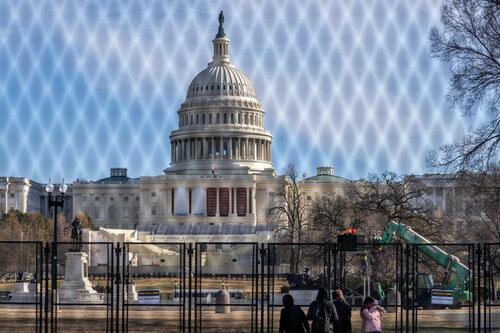Congress will formally certify President-elect Donald Trump’s victory in the 2024 election on Jan. 6, marking the final ceremonial step to confirm Trump as the next commander-in-chief.
Vice President Kamala Harris, as president of the Senate, will officiate the certification during a joint session of Congress and declare her erstwhile rival the winner in the presidential contest.
It’s expected to be largely a quiet, formal process this year. Harris has said she intends to treat her role as ceremonial. Democrats in Congress have already made clear that they accept Trump’s win.
For members of both parties, the day can’t help but recall the events that unfolded four years prior.
During the certification of the 2020 election results on Jan. 6, 2021, pro-Trump protesters entered the Capitol, placing the certification process on hold and putting an end to a Republican effort to object to certain electoral slates.
Following the Capitol breach, Republican leaders like Sen. Mitch McConnell (R-Ky.) and Rep. Kevin McCarthy (R-Calif.) distanced themselves from Trump, joining Democrats in saying he was ultimately responsible for the incident.
The House quickly pushed through a second impeachment resolution against Trump, though it failed in the Senate. Pundits believed Trump’s political future was at an end.
For both sides of the aisle, the certification of Trump’s re-election four years later is likely a reminder of the magnitude of the political comeback the president-elect has achieved.
The Process
Lawmakers from both chambers will gather in the House chamber, which is traditionally used for joint sessions, at 1 p.m. ET to begin the process of certification.
Under the process mandated by law, the official electoral slates will be transported into the House chamber in large mahogany boxes. Harris will then open the sealed electoral slates and hand them to the congressional tellers to be read aloud in alphabetical order.
As these votes are read off, lawmakers have the opportunity to raise any objections they see fit, so long as both a representative and a senator sign off on the objection. At that point, both chambers would meet for two hours to debate the objection before returning to a joint session.
These objections have been a relatively common fixture of American political life in the 21st century, with objections to certain electoral votes brought in 2001, 2005, 2017, and 2021.
This year, however, Democrats have indicated that they expect no objections will be brought against certifying Trump’s win.
Jan. 6, 2021
Though Jan. 6 was once seen as a relatively uneventful day in American political life, for the past four years, the date has been a cultural flashpoint.
During a speech at the Ellipse four years ago, Trump, alleging that the 2020 election results were tainted by fraud, told his supporters to go to the Capitol to “peacefully and patriotically“ protest the certification of the results.
In the speech, Trump urged then-Vice President Mike Pence to reject certain electoral slates from key battleground states.
When the crowd arrived at the Capitol, chaos ensued as some protesters entered the Capitol. Most entered through the main entrances, though a minority entered through smashed windows.
Ultimately, the Capitol was cleared of protesters after Trump urged his supporters to leave. Though some damages had been done to the building and some offices, certification proceeded without further objections.
Critics of Trump alleged that the Capitol breach was the culmination of an attempted insurrection against the U.S. government.
Supporters of Trump say the narratives surrounding the events of the day have been misrepresented and note Trump’s role in ending the breach and how he left office unchallenged on Jan. 20, 2021.

